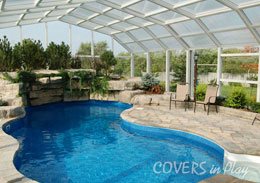You should always ensure that your swimming pool is protected, especially when your pool is not in use. There are several ways to do this, eg. B. Install a pool alarm system or installing a pool cover. However, it is the most effective way to keep your swimming pool safe.
Unfortunately, statistics show that in most countries, more than 300 children, all under the age of five, drown in swimming pools every year, with the pool usually in their own backyard.
You can purchase a swimming pool glass enclosure for increased safety, ease of maintenance, greater comfort, and more.

Having your own swimming pool is a great privilege, but it comes with a certain level of responsibility for safety. That means you have to do your best to avoid accidents.
Pool fences give you a sense of security. This technique not only covers your pool, it also ensures that nothing falls. This is especially important if you have small children or pets.
Covering the pool allows you to let your children play outside without constantly keeping them away.
As safe as you are with your pool, you can't prevent all accidents while a pool fence can. This prevents people from accidentally falling and someone in the pool area slipping and getting hurt.

